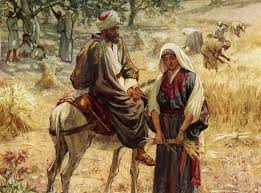Scene Two:
Ruth Meets Bo’az in the Grain Field
2: 1-23

This chapter gives us a glimpse of the life of the poor in ancient Palestine. There were not many ways of making a living open to widows, but one way was provided by the custom of gleaning. It was laid down in the Torah that at harvest-time a man must not reap his land to the very border, not should he pick up what was left after the reapers went through (Leviticus 19:9 and 23:22). Indeed, if he forgot a bundle of harvested grain stalks and left it in the field he was forbidden to go back for it (Deuteronomy 24:19). In this way there was a certain provision was made for the poor. They could go through the fields after the reapers and glean what they could. Similar provision was made concerning the grape harvest (Leviticus 19:10 and Deuteronomy 24:21), and the olive harvest (Deuteronomy 24:20). Ruth and Na’omi were obviously poor and it was the providence of YHVH that allowed them to arrive at the beginning of the barley harvest.
After three months, Ruth proceeds, under the direction of Na’omi, to the field where Bo’az was winnowing grain in the cool refreshing breeze of the Palestine summer evening. And seizing the moment when Bo’az had retired to rest on the threshing floor, Ruth reminds him that he is her nearest kinsman and that there were certain duties he owed to Na’omi and herself. In the stillness of the night Bo’az readily acknowledges his obligations, but reminds Ruth that there is a nearer kinsman than he, whose rights had priority over his own. He expresses his determination, in the event that the unnamed kinsman would fail to accept his responsibilities to the last detail.
Before God changes our circumstances, He wants to change our hearts. If our circumstances change for the better, but we remain the same, then the outcome will be worse. ADONAI’s purpose in providence is not to make us comfortable in this world, but to make us comfortable in conforming to the image of His Son (Romans 8:29). Godly character is the divine goal for all of His children.
Na’omi was bitter against YHVH, but Ruth was willing for God to have His way in her life, so the LORD began His gracious work with her. Ruth would influence Na’omi to align her will to God’s plan that would eventually bring God’s Son into the world. Ruth and Na’omi had no idea that they were part of an eternal plan that would fulfill YHVH’s promise to Abraham that his seed would bring blessing to the whole world (Genesis 12:1-3). Ruth’s story begins with the death of a husband, but will end with the birth of a baby.



Leave A Comment